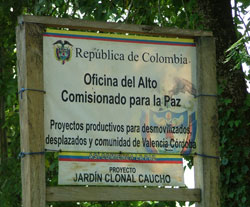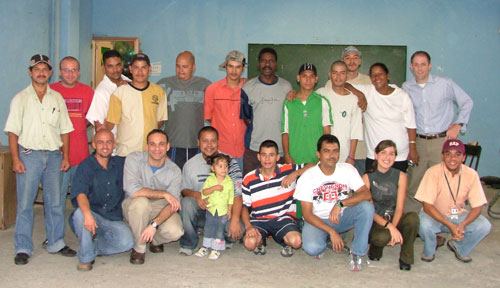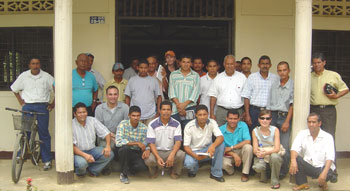In September, Program Officer Jonathan Morgenstein, Program Assistant William Owens, and their interpreter Iciar Gomez conducted a two and a half week assessment of Colombia’s reintegration process for recently demobilized paramilitaries. The team traveled to Bogota and Medellin as well as to the northern department of Cordoba, interviewing over one hundred demobilized ex-AUC combatants as well as scores of government officials, NGO representatives, Catholic and Protestant church leaders, and civil society workers.
 In September, Program Officer Jonathan Morgenstein, Program Assistant William Owens, and their interpreter Iciar Gomez conducted a two and a half week assessment of Colombia’s reintegration process for recently demobilized paramilitaries. The team traveled to Bogota and Medellin as well as to the northern department of Cordoba, interviewing over one hundred demobilized ex-AUC combatants as well as scores of government officials, NGO representatives, Catholic and Protestant church leaders, and civil society workers.
In September, Program Officer Jonathan Morgenstein, Program Assistant William Owens, and their interpreter Iciar Gomez conducted a two and a half week assessment of Colombia’s reintegration process for recently demobilized paramilitaries. The team traveled to Bogota and Medellin as well as to the northern department of Cordoba, interviewing over one hundred demobilized ex-AUC combatants as well as scores of government officials, NGO representatives, Catholic and Protestant church leaders, and civil society workers.
 Controversy has swirled around the Colombian demobilization process, which has dismantled the majority of United Auto-Defense Forces of Colombia (AUC) paramilitary structures, with almost thirty-one thousand ex-Autodefensas turning in their weapons and registering with the demobilization program. This process was heavily funded by the United States Agency for International Development (USAID) and operated by the International Organization for Migration (IOM). The USIP mission received significant logistical support from both USAID and IOM, but operated independently.
Controversy has swirled around the Colombian demobilization process, which has dismantled the majority of United Auto-Defense Forces of Colombia (AUC) paramilitary structures, with almost thirty-one thousand ex-Autodefensas turning in their weapons and registering with the demobilization program. This process was heavily funded by the United States Agency for International Development (USAID) and operated by the International Organization for Migration (IOM). The USIP mission received significant logistical support from both USAID and IOM, but operated independently.
While the AUC demobilization itself proceeded much more successfully than most anticipated, the question of how long this success lasts remains to be answered. The key to permanent demobilization is the reinsertion process so that the former fighters feel their lives are better served reintegrating into civilian life and society than returning to the jungles with their guns.
 The USIP team came away with a number of impressions on the need to address the reintegration within the next half-year to a year. The demobilized receive a monthly stipend for 18 to 24 months from the moment they turn in their weapons and that money will begin to run out by the middle of 2007. Important challenges to the educational, job-training, job-provision and psycho-social support mechanisms of the reintegration program are of serious concern, and could threaten the success of the DDR program. There are already some indications that disillusioned ex-combatants are returning to re-forming paramilitary units or being hired by drug traffickers.
The USIP team came away with a number of impressions on the need to address the reintegration within the next half-year to a year. The demobilized receive a monthly stipend for 18 to 24 months from the moment they turn in their weapons and that money will begin to run out by the middle of 2007. Important challenges to the educational, job-training, job-provision and psycho-social support mechanisms of the reintegration program are of serious concern, and could threaten the success of the DDR program. There are already some indications that disillusioned ex-combatants are returning to re-forming paramilitary units or being hired by drug traffickers.
By the end of the year, USIP intends to hold a forum addressing these issues with key stakeholders, and plans to publish a report with their major findings.


